One of the sites that Dunhuang is famous for is the Mogao Grottoes, a World Cultural Heritage Site with well preserved frescoes from the 4th through 8th centuries AD. This was actually the first World Heritage Site I learned about when planning a research project with the Getty Conservation Institute to protect the grottoes from air pollution damage in 1989. My part of the project focused on the Yungang Grottoes which later became world heritage listed in 2001, ten years after my work there.
We got up early to get the 8:00am bus out to Mogao. Unfortunately, the Lonely Planet guidebook doesn't have the Chinese characters for Mogao and there are a lot of buses to choose from at the station. The choice seemed obvious, however, we picked the bus with what looked like Hong Kongers with cameras rather than any of the ones heavily laden with baggage that must be going longer distances. It was the correct choice.
Mogao is a complicated, and somewhat annoying place to visit. At Yungang or Longmen you pay admission and are free to wander about and peer in and marvel at the intricate carvings. At least that's what I did. I was spoiled by working in Yungang and being able to look at the caves in the moonlight when no one else was around and ponder them at leisure. At Mogao they keep most of the caves locked up and you must be let in by guides. There are various admission fees for 10 caves or 30 caves, though we were required to buy the maximum and then wait until they could collect all of the foreigners together in a big bunch to be led around together by an "expert Chinese speaking guide."




There didn't appear to be many people to make up our group and it seemed that we might be waiting a while for additional buses to arrive before they would start our tour. We met an American couple, Duke and Karen, both physical therapists who have been travelling for 9 months through Nepal (where they worked for a while) and Pakistan to here. They've had a wonderful time, though Duke now has a stomach disorder and they are going to start heading home shortly. Fortunately for us, they had a spare lithium battery that fit our Nikon which we purchased from them for 50Y.
Our group also included a Malaysian woman named Annette that reminded us of a person from our Chinese class that was always in a hurry, and a Chinese guy who knew a few English words. While we were waiting for our group to grow in size Annette, who speaks some Chinese and is very pushy managed to get us admitted because she was very insistent about needing to get a bus in two hours. At first we were happy about this, but Annette, who could speak to the guide (he knew no English) convinced him to rush and show us 30 caves in 2 hours because she had paid for 30 caves and wanted her money's worth. Normally, you get two sessions of 15 caves, one set in the morning and one set in the afternoon. We didn't have much choice other than follow along, but this pace was far too fast to appreciate the caves.




We took the bus back into town for lunch planning to take the 2:00pm bus back to the caves for, hopefully, a more leisurely afternoon viewing session. Unfortunately, the afternoon bus went at 1:30pm and we missed it. Disappointed, we walked around town a bit and bought some postcards. I find Dunhuang pleasant partly because there are only two major streets that meet in a T so I always know where I am. Today was Sunday so the markets were all busy.
At 7pm we rented two bicycles and rode down to the big sand dunes around Crescent Lake. The ride was flat and very easy passing through some farmland growing wheat and some other funny plant with five leaves :-). Outside of Crescent Lake is a tourist trap area with souvenirs and stuff and an admission charge of 2Y. Right inside the gate is a herd of 40 or so camels making the pleasant sounds that camels make. We rented two camels for a round trip to the lake. It wouldn't have been that difficult a walk through the sand, but I'm partial to camels and hadn't ridden a bactrian camel before. The camels drop you off near the lake and wait for you to be ready to return.
The lake was very pleasant and actually shaped like a crescent moon. It was described as "nothing more than a mud hole" in Lonely Planet, but they didn't like much in China. The sand dunes rising up all around it were pretty impressive. They are the type of "true" sand dunes I associate with the "real" desert like in Lawrence of Arabia. It was windy and you could watch the sand moving around.




My camel chose to run me back to the gate almost bouncing me off until I got a firm grip with my legs. There, we ran into Duke and Karen and Annette who had hired bikes from the same place we had and were on their way back to town. We rode back and had dinner with them at the restaurant adjacent to the bike hire place. Annette made a big production out of ordering precisely described dishes and visiting the kitchen to instruct the cook. Whereas the rest of us lean more toward the smile-and-hope-they-bring-us-some-food approach to ordering. The food this time was only fair, though Annette had mentioned not being too fond of Chinese food so maybe she had them leave out some of the usual spices. The food was still cheap and filling and the company was good so we talked for a while over tea.
(May 27, 1991) DUNHUANG
We were awakened early by the plumbing again, just before the loudspeakers in the streets started babbling in Chinese. Why does this town seem so loud in the early hours of the morning? We got up and grabbed a quick breakfast, 4 deep fried churro like things, which cost only 4 mao (~8 cents), on the way to the bus to Mogao planning to give it another try. We found the British woman and a couple of Germans waiting there today. The bus had to stop for gas at one of the few petrol stations I've seen in China. Everybody had to get off the bus, then we all had to push and shove to get back on even though there were plenty of seats and most people seemed to end up back where they were originally.
Mogao was better toady. It only cost one more admission since one of our tickets from yesterday didn't get punched. Today's group went around slowly looking at stuff and we all made the guide wait and not rush us about. He didn't provide his "expert Chinese guidance" since none of us spoke Chinese. One of the best parts about today was that we got to see people at work in the caves since it's Monday and not Sunday. In cave 419 someone was re-painting the murals. There was scaffolding holding them up like Michelangelo and jars and bowls of paints mixed up all over the place. In another cave (275) people were repairing cracks with some mud paste stuff and a couple of caves had people sketching or using drafting paper to record what was there.
Today I had time to take down a few notes as we went into each cave. Yesterday we were going too fast to even note down the numbers of each cave or read anything about them in our guidebook. Most are the same as the ones we zipped in and out of yesterday, but today we get to look at the murals.
I won't go into detail about each and every cave, but a couple of the more famous ones we saw included Caves 16 & 17. Cave 17 is a small cave inside of Cave 16 where the famous stash of manuscripts were sealed up and uncovered by a monk around the turn of the century. He sold off much of the collection to Sir Aurel Stein including what may be the oldest printed book in existence (circa 868 AD). These are now in the possession of the British Museum, but they weren't on display the last time we were there.
We also saw the 34.5 meter tall Buddha in cave 96. As you enter the cave all you see is his hemline which had dragons painted along the edge and it looks like you are approaching a wall. As you get through the bottle neck entrance the ceiling opens up and you can look up (a long way) at Buddha. You can also run around behind him. We were told that the paint had been retouched during the Qing dynasty, but after seeing cave 419, I wonder how many have been done more recently. The colors are truly brilliant in many of the caves, though it could be due to the dry air and lack of light.




After seeing about 18 caves it was was 10:50am and we had to choose between catching the 11:00am bus back to the city or taking a 3-hour break followed by more cave viewing from 2:00 till 4:00pm. We decided to go because we both were feeling tired and the wind was kicking up a lot of dust which made outdoor eating seem like an unpleasant proposition.
Mogao is such a weird place. The caves are wonderful and impressive but annoying to see because of the system they have devised of collecting people in groups they can shepherd around. I don't really object to them keeping all the caves locked up, though it would be better if the doors provided more protection from the environment. The current doors have slits that let air and plenty of sand in freely. There are no photos allowed inside but they do nothing to stop people from touching the murals. I saw a Chinese tourist chipping off a piece of plaster for a souvenir. Upon leaving we saw the sign "To Cherish Cultural Relics is Everybody's Duty."
We had a lazy afternoon followed by a disappointing meal at the Dunhuang Hotel (They've been great for 2 out of 3). We stopped by CITS, as we've done several times, to find out about our train tickets but were told they'll call us in the morning. We plan to leave in the morning.
More Photos from Dunhuang
(May 28, 1991) LIUYUAN TO DAHEYAN
Today was escape from Dunhuang day, not that there was anything wrong with Dunhuang, we were just a little uncertain about how to proceed onward to Turfan. We went to CITS instead of doing the arrangements ourselves because the nearest railway station is 2.5 hours away and it would have probably taken all day. CITS kept promising to help get our tickets and we left a 40Y deposit. But all they did for us was tell us to come back at another time and we'll let you know more. They didn't call us this morning either. We wrote them off as a loss and got on a bus to Liuyuan after a nice lunch in a small noodle shop across the street from the hotel.
The bus to Liuyuan was 6Y each and full as usual buses are. No one else put their bags on top and neither did we. We were in seats near the back and a bunch of bags got piled in the aisle to serve as a makeshift card table for a group of people. Our bags joined in the pile. A bunch of other people were singing along the way, a real happy group. The weird part was occasionally hearing a recognizable melody like "Home on the Range," or "Auld Lang Syne," but the words were in Chinese. Three mini-vans (Toyota) with the Japanese tour group passed the bus on the way to Liuyuan and we wondered if they would take all of the soft sleepers. One minivan broke down and we passed them, but it was fixed and they all passed us again later on, waving as they went by.
Liuyuan is pretty small so it was easy to find the train station. We got there less than an hour before the train was supposed to leave but there was no sign of a ticket seller. We wandered around saying "Wo yao piao" (we want tickets) to anyone in sight and kept getting pointed toward a closed window toward the middle of the station. Not knowing quite what to do we hung around the window planning to just get on the train if it came. But the window opened and I bought two tickets for Turfan with no problem (213Y each).
We shared our train compartment with two very well groomed, quiet, young Chinese men who we later found to be the tour leaders for the Japanese group from the mini vans. The Japanese are the same group we saw in Dunhuang complete with "Indiana-san". They were all stashed elsewhere and we didn't see them at the station in Liuyuan. I fell asleep early and slept pretty soundly until the attendant woke us ~6am for the Turfan Zhan (station).
(May 29, 1991) TURFAN
The Turfan Train Station is actually in a city called Daheyan about an hour drive north of Turfan. There were several buses waiting outside the station including a Nissan for the Japanese group. We tried several of them getting on and asking "Turfan?" but none seemed to be for Turfan. That, or our natural tendency to raise the voice to indicate a question may change the word Turfan into a totally different word with another tone in Chinese. Finally someone directed us up the road and we walked a little way until we found a bus parking lot. (Aside: we've gotten to the stage where we don't trust any directions given in the Lonely Planet guide without a couple of outside confirmations. However, their directions to the bus in this case were correct, though the times have changed.) This bus parking lot was not the bus station but someone there led us out and down the street part way pointing until we were heading in the right direction. We found the bus station at 6:30am.
At the station I made my way to the front of the line at the ticket counter and asked for 2 tickets to Turfan (in Chinese, it's one of the phrases I'm pretty good at now). I was told 8:00, thinking this was the time the bus left I asked again for 2 tickets and held out some money. The guy shook his head and said 8:00 again. Other people were getting the same response to their queries and no one was getting tickets so we figured 8:00 was when tickets would go on sale. They actually went on sale around 7:30 or so but the bus didn't leave until 8:30 so we got tickets and got on the bus okay (2.3Y each). Daheyan was not an exciting place to hang around, but fortunately we were only there for a couple of hours, though I spent part of the time wishing I had stayed on the train to Urumqi.
Another crowded bus. They changed the ticket routine on us, too. The other buses we have taken all had assigned seats, this one instead had a boarding order according to the order in which you bought your ticket and you could pick any seat you want. This seems like a better system. We got on and got a couple of seats near the rear. This is good when you have big bags that need to go in the aisles and people also have to stand in the aisles up nearer the front.
When we arrived in Turfan a "taxi" driver offered to take us to a hotel for only 2 mao (4 cents). We agreed. He recommended the Oasis Hotel, but we didn't know where that was so we asked to go to the Turfan Hotel which we believed was centrally located. He took us there but at reception we found they only had dormitory beds and had not heard of the doubles with showers mentioned in LP. So we had our taxi take us to the Oasis which turns out to have been renamed from Hotel #2 which was what it was called when Lonely Planet did their write-up. We have a nice room with bathroom and a good shower, AC, etc. for 100Y. The Japanese group were all here in the lobby along with their guides from our train compartment. Although they were whisked away promptly from Daheyan, it doesn't appear that they've done anything during the time we spent sitting on our bags at the bus station since breakfast isn't served until 9:30 or 10am. We arranged our "taxi" for the whole day tomorrow for 120Y (we can bring 4 more friends for no extra charge :-)). It seemed like a reasonable cost because the sites in the surrounding area require about 200 miles of driving. Too far to bike in the desert!!
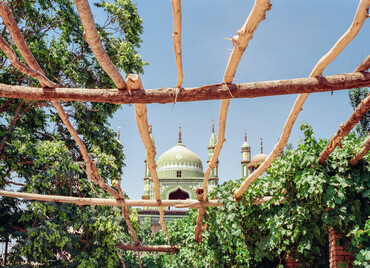
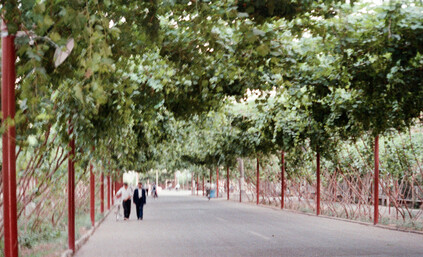
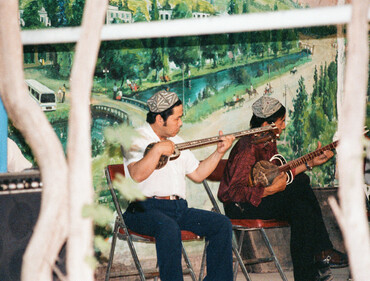
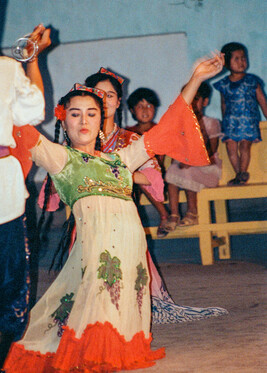
After showering and changing we took a short walk. Turfan is very pleasant and probably our favorite stop during the journey. Grape vines on trellises arch over the side walks and across the streets providing plenty of shade. We walked over to the Turfan hotel and found another wing with another reception area. Probably where they are hiding those doubles. We went back to our hotel and had the expensive set meal for lunch. Good food, convenient location. After trying to serve myself some noodles that stretched on for miles I gave up and bit them off. One of the waitresses saw me and was very amused by this.
We took another walk in the evening after napping, sending some postcards, and talking to a Chinese petroleum engineer we met in the lobby. We saw our taxi guy and he told us there would be music at 10pm at the Turfan Hotel. We were running a bit late but he put us on a donkey cart to get us there quickly saying, "my donkey, no charge." He seems to be quite an operator in this town, and infinitely more helpful than CITS.
The music and dancing was not as entertaining as the huge group of Japanese tourists, plus a huge group of German tourists in the audience. One Japanese man had to take a picture and kept backing up and then bending over backwards to try to get everything in his shot. I was sure he was going to fall over before he was through. We saw "Indiana-san" out walking on our way back to the hotel and he said hello.
(May 30, 1991) TURFAN
Turfan is a wonderful Mediterranean-style Oasis plunked down in the middle of the desert in China. The streets are lined with grape arbors, there are olive trees and the Uygur food is reminiscent of Italian and Greek with fresh pasta and tomatoes. Today we took our hired car for the day and saw all the sites in the surrounding area. It worked out very well since we got going early and were always a step ahead of the larger German and Japanese tour groups. Thus we got the sites all to ourselves.
Since we started at 9:00am and the hotel breakfast wasn't until 9:30 we asked our driver to stop somewhere for food. We were taken to a Uygur restaurant down some obscure back street next to a lumber yard. It was full of Uygur men eating breakfast. We got seated on stools at a small table and food eventually came out. You wash your bowl with the tea and pour it on the floor. The food was excellent, very filling and very cheap.
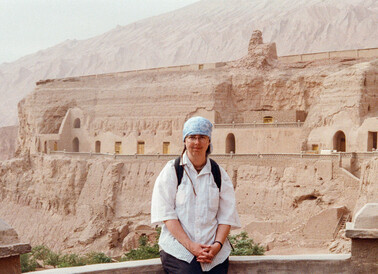
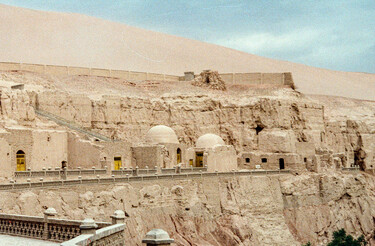
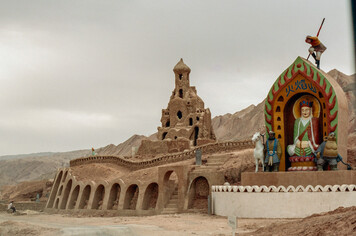
Our first stop was Bezeklik Thousand Buddha Caves.
The place is small, and much of the sculpture and
frescoes have been removed or destroyed. However, the setting is beautiful and
we were there all by ourselves. As we were leaving the German group
showed up in their "ROTEL" the hotel that rolls.
We next went to the ruins of the ancient Uygur capital of Gaochang
abandoned since the 9th century AD. It's huge and we wandered around
for a long time finding pottery shards here and there. We are having
good luck with the weather today because it is slightly overcast
making it cooler than usual. We've still been rapidly depleting the
water in our canteens and there's no mistaking we're in a desert. We
went back to the same restaurant for lunch. A heaping portion of
freshly made pasta with tomatoes and other vegetables and a little
lamb, wonderful. It wasn't the type of place I would have wandered
into on my own so we felt quite fortunate that we were taken there.
We saw several other quick sites before and after lunch. The flaming
mountains which weren't lit well today, but I'd rather have the clouds
for the heat protection. The Atsana Graves which were no big deal,
the Imin Minaret,
the city water supply, and another Mosque.
After lunch we went to another city in ruins, Jiaohe.
Jiaohe was abandoned after its destruction by the Mongols led by Genghis Khan in the 13th century.
It has more
buildings intact than Gaochang and seems more set up for tourism. A
brick road has been laid providing a well defined path and signs are
posted here and there identifying the buildings. We were still there
alone, but it was right after a big lunch and the combination of a big
meal and midday sun made me want to lie down and nap. We found a
shady place in the ruins of the old monastery and sat for 1/2 an hour
or more and finished our water. It was very peaceful and we remarked
that this is why we're not on a tour so we can sit here and relax as
long as we like rather than having to get back to a bus at
such-and-such a time only to find ourselves waiting around for someone
else to get done with their shopping.
We finally dragged ourselves to our feet and headed back. As usual
the ROTEL had just pulled up and the Germans were ready to descend on
Jiaohe. We talked to one man who told us they had all started in
Moscow and were driving to Beijing. He spoke a little English, we a
little German and the conversation went roughly 70/30 English/German.
We got up and caught the bus to Urumqi first thing. Our taxi guy was
outside of the hotel and one of his flunkies drove us to the bus
station. There we found a very jolly Chinese gentleman selling bus
tickets and hurrying us onto the bus. I don't know if we got the 9:00am
bus running late or the 10:00am bus running early but it was 9:35am and
the bus pulled out as soon as we got on. This was a luxury bus which
means room for the knees. It also wasn't full so we each took two
seats, one for the backpack, one for us. (Fare 10.8Y each).
The ride to Urumqi was very pleasant. We went through lots of grazing
land and along a small river between snow capped mountains in the
distance. I had been expecting more desert. The trip took ~4 hours +
1/2 hour for lunch. We arrived at a marketplace in Urumqi where we
found a cab to take us to a hotel. Lonely Planet describes Urumqi as
one of the ugliest cities in China. While it's pretty blah and
industrial, there are a lot of cities like it in China. Urumqi is the
end of the rail line in Western China, though there's a lot more
country further west. Fortunately, it is connected by air.
We chose to stay at the Bogeda Hotel. We got a recommendation
for the Hang Shan Hotel from some people from Kansas we saw boarding
another bus when we got off of ours. Unfortunately, the Hang Shan
seems to be having a military convention of some sort and won't let
anyone without a badge in the door. We're not very pleased with the
Bogeda, though the room is fine and the hall attendant is very cute as
she skips down the hallway humming. We just had an interaction with
the lobby staff that went something like:
This went on for a while since the hotel was acting like a full
service hotel with counters labeled, bank, post, information, taxi,
etc. We tried to ask if we could change money at another time, perhaps
it was break time, but to no avail. Information didn't know where a
bank was or have a map but sent us to the store for a map. The store
didn't have maps but had DOS and XENIX books on display. This is what
I feared travelling in China would be like a lot of the time but
fortunately this level of indifference and shrugged shoulders has been
pretty rare and we've gotten used to people going out of their way to
help us so we were a bit unprepared today. Fortunately, we had enough
cash to get a taxi and the driver took us to a bank so we now have
FEC's again.
We picked up a bus map from a street vendor and took a bus to the CAAC
office where we purchased two plane tickets to Kashgar. This cost
465Y each, but I can't face 3 days through the desert on a crowded
Chinese bus. We're also running out of time on our visa's.
In the evening we went out searching for food. We turned down a side
lane and half a dozen noodle and kebab vendors wanted us. We chose
one that was easiest to get seats at and had 2 large plates of
noodles, 5 kebabs and beer for only 4.5Y.
Urumqi has a definite military presence that I haven't noticed in
other parts of China. It feels like the town is being occupied but it
may be due to the convention going on at the Hang Shan. It's
impossible to get any news (either about China or the outside world)
so we wonder what's going on in the world. Other than buses most of
the traffic is green army jeeps, but who can take an officer with a
uniform 3 sizes too big very seriously.
Our plane tickets to Kashgar are for June 4. Not wanting to hang
around in Urumqi until then, we got up early to take a field trip to
Tianchi (Heavenly Lake). No staff could be found in the hotel lobby
so I knocked on doors near the front desk until I found a staff person
asleep that woke up long enough to check us out. We were up at the
crack of dawn at 8:30am, the whole country being on Beijing time.
We went to the ticket booth for the bus but were told there were no
tickets. Not knowing what else to do we stood around looking forlorn
at the bus stop for a while. A tour operator appeared who got us on a
bus. It was a weird affair. He ran around checking different buses,
no seats, he ran around some more, another bus came, with seats. It
was a rough bumpy, bone jarring ride but after 3 hours we are now in
the Swiss Alps. We had a lovely lunch of noodles and soup and are set
with accommodation in a yurt for 10Y.
Tianchi is in the Xinjiang Tianshan in Central Asia, one of the largest mountain
ranges in the world. It became listed on the
World Heritage List 20 years after our visit.
Tianchi is very pleasant. We walked a little ways through pine forest
and found a place to sit near a waterfall. One of our LP pages got
away from John in the wind and we waved goodbye as it went down over
the falls. It was the page with the map of Urumqi, no great loss.
The plan now is just to sit and relax. Since most visitors make this a
day trip, there are few people around after the buses leave after
7pm. There are a number of yurts with Kazakhs living nearby herding
sheep, goats, cows, horses, etc. (Herds-R-us). There is also a group
of 4 Koreans who were looking as lost as us back at the bus stop in
Urumqi who made it here on another bus.
There are plenty of horses for hire. In the evening we took a walk
and saw the 12-year-old Kazakh boys playing games with the horses.
Normal kid stuff, they learn to ride and speak enough foreign
languages to change money, though most just want to say hello and how
are you and are very friendly. They then race off on their horse and
steal a friends hat who chases after them on his horse at
a terrifyingly high speed, like teenagers with fast cars.
We had more noodles for dinner plus kebabs cooked on bicycle spokes.
The restaurant has a special ambiance. A side of meat is hanging on a
hook next to the door, a few saddles came in and were sitting around
with the horses parked just outside. An occasional goat or cow walks
past the opening and peers in and there's a lot of "baahing" going on
in the distance. This is also one of the first places we've noticed
many wild birds singing. A woollie just went by. Alas, there are 3
more people in our yurt so we don't have the place to ourselves. One
is from Singapore and speaks English fluently, the other two from
Hong Kong and will be going on to Kashgar. There are five more
Hong Kongers in the neighboring yurt. We experienced a bit of Kazakh
dance to disco music then went to bed.
It rained a bit in the wee hours and then a gust of wind took part of
the yurt roof away but the rain stopped so we just snuggled deeper
into our sleeping bags. We got up and took a horse ride to the top of
telephone pole peak. A 2.5 hour ride is enough to get the back side a bit
sore. A Kazakh came along on a third horse to make sure we were okay.
The horses responded well and we got a nice view of the lake from high
up. We also saw a lot of lichens on purple and green rocks.
We came back for a non-spectacular fried rice lunch, then sat around
waiting until the bus comes to return us to Urumqi. We talked to the
English speaking tour guide at lunch. I'm not sure what there is to
guide tours of here, at least not for her since she is a real city
girl. She seems very unhappy. She recently graduated from the
Foreign Language Institute in Xi'an and was assigned to be a tour guide
here in Kazakh country. It sounded like she had only been there a few
days and was miserable. She said she wanted to be a teacher somewhere
but she had no choice and must be a tour guide. She complained about
not understanding the language of the Kazakhs who are a fairly insular
people and not that fond of the Han Chinese. We tried to console her
a little and told her stories about Switzerland which looks remarkably
similar to the Tianchi area. We promised to send her some photos of
Switzerland when we get home and got her address.
We caught the bus back to Urumqi, 3 hours of bumping along on my sore
behind. We were let off outside the Bogeda Hotel. We find it much
more pleasant this time. The cute floor attendant remembered us and
we found a very pleasant waitress in the restaurant who practiced her
English with us. Dinner of 2 dishes, rice, tea was 11Y, cheaper than
we expected for a hotel. We didn't have any FEC smaller than 100Y and
the restaurant didn't have change but the waitress took our RMB
instead. You don't get a million receipts when you pay with RMB.
After dinner we went for a walk and found the Hong Kongers from
Tianchi sitting outside our hotel in a confused state with Mr. Li
(there are a lot of Li's) our tour operator from Tianchi, running
around finding them accommodation. They evidently didn't have enough
room at the Bogeda and they had tried somewhere else on their own and
run into problems because they tried to pretend they were Chinese to
get a cheaper price and were found out and then refused rooms
altogether. Seems like we're doing better than people who speak the
language, because we've gotten a room, retrieved our left luggage,
washed up, had dinner and went for a walk while they're sitting on
their bags. Their plane tickets to Kashgar are also uncertain because
they thought CAAC was closed on June 1, which was a holiday, so they
didn't try and get them in advance. That's the day we bought our
tickets. We didn't know it was a holiday :-).
I still have a pain in the a** from yesterday's horseback ride. We're
not doing much today. We slept in. Check out is at 2:00pm, as is
lunch after which we will make our way to CAAC and hopefully onward to
Kashgar.
After lunch we walked to CAAC. On the way, we stopped to "admire" an
advertisement for an oil refinery which was depicted with a beaker and
a perfume bottle. At this point a guy came up to offer to help if we
had lost our way. He was a student and had been studying English for
7 years and wanted to practice. He walked the rest of the way and
waited with us until the airport bus came. A very nice, helpful guy.
At the airport there was a long line of people waiting at a check-in
counter with no sign above it. None of the counters had signs, in
fact, and I don't know why people picked that one to queue up at.
Suddenly several ticket counter signs lit up with various flight #'s.
Ours was the one with the huge line, but most people didn't want that
flight. In the ensuing confusion of bags, I climbed over and around
and made my way to the front and was one of the first to check in.
Not having any bags encumbering me helped and I planted myself in
front of the scale so no one could get their bags on it (though they
were trying) and thrust out my tickets as the Chinese do. I was
successful and came away with 2 boarding cards. I moved sideways from
the scale while the agent was processing me and let two families fight out
who could get their stuff on the scales next. The hard part was
getting away from the desk through the hoard that had now figured out at
which counter to cluster.
I don't understand the lines. It happened twice more at the security
check and for boarding. People formed a nice neat orderly looking
line at the closed doors and all waited patiently. Once the doors
open, the line disintegrates as everyone rushes for the door. It
turned out that we got a jet rather than a propeller plane so the trip
was only 1.5 hours instead of the expected 5. The plane was packed
and most people didn't check bags either so there was a lot of luggage
in the aisles and in peoples laps. We were just barely able to
squeeze our packs under the seats where our feet could have gone.
In Kashgar we got on the CAAC bus from the airport to town as
recommended by LP. This turned out to be a mistake as we saw a bus
with "Seman Hotel" emblazoned across the side pull away as we looked
out from our bus window. It worked out fine in the end, we got to
town, walked a couple of blocks and found a pony cart that took us to
the Seman Hotel. (The former Russian Consulate) where we have a
double for 60Y. The former British Consulate (Chini Bagh) is also a
hotel but according to LP is quite run down. Too bad, since I'm
enjoying reading Lady McCartney's book "An English Lady in Chinese
Turkestan" at the moment.
One gets a strange kind of jet lag in China. The whole country runs on
Beijing time but that means it doesn't get dark until close to
midnight on this side of the country. I don't know if I should be
going to bed or getting dinner at 10pm.
I'm recovering from a relapse of my head cold so I have rested for a
couple of days. Fortunately there are a lot of cafes clustered around
the hotel so I can venture out to get a small bite to eat then come
back and rest a bit more. A place called John's Cafe is right inside
the hotel and is a very pleasant place to sit and sip lemon tea. "John" is a
Chinese hustler who arranges jeeps or tickets or whatever you need for
a small commission. We overheard a deal going on between him, 3
pretty geeky looking guys (who am I to talk!) and a few Uygurs
concerning finding some gemstones and transport to the border. All I
could think was that this seems like a very elaborate D & D game
because these guys didn't look like they could find their way out of
the Glendale Galleria let alone pull off some gem deal and get into
Afghanistan.
Today we went to the PSB to get our Visas, which expire tomorrow,
extended. At first the guy said these have already been extended once
and can not be extended again. We said but we just need a few days to
get to the border at which point the guy became very helpful and added
a Visa extension stamp on the spot. He decided to give us a week, in
case the bus breaks down or something. So we can stay for Sunday
market and still be legal when we get to the border.
We began taking our Malaria pills today.
We ate breakfast and lunch in John's Cafe. We keep seeing a lot of
the same faces there as though no one visiting Kashgar is being much
more ambitious than us, except for three British guys who seem to be
on a shopping spree. Yesterday they had a tape measure and some
spices, today, robes and Lawrence of Arabia get-ups, and they are
talking about getting some silk waistcoats made. They are heading
into Iran which they claim is open to British travellers with papers
stamped at Whitehall certifying that they are not spies. Hmmm.
We took a pony cart to the
Id Kah Mosque
and market area and walked
from there down to People's Park and saw one of the few Mao statues
we've seen while in China. We visited Poste Restante at the post
office. Nothing had come for us, but Mr. Fielding and Mr. Franklin should
collect their mail, it's really piling up.
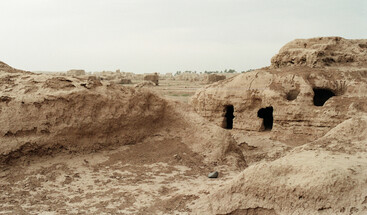
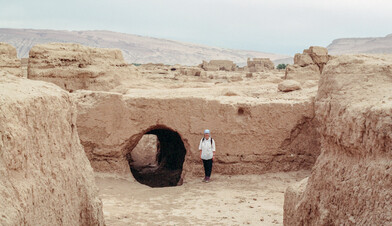
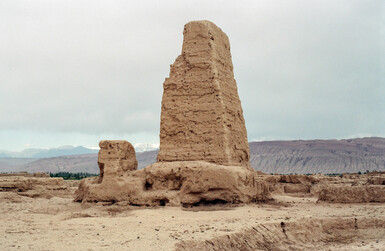
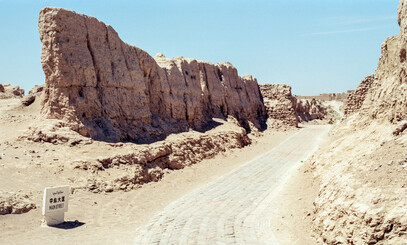
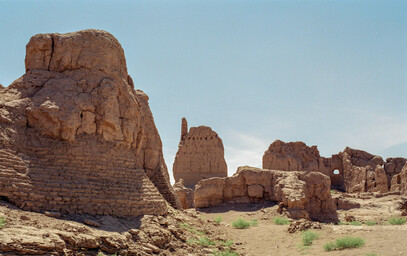
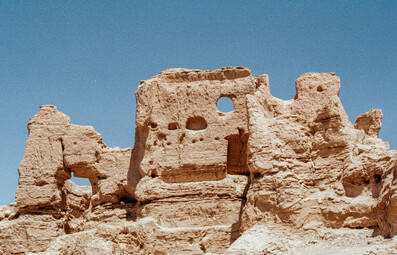
More Photos from Turfan
(June 1, 1991) URUMQI
(June 2, 1991) TIANCHI - Heavenly Lake
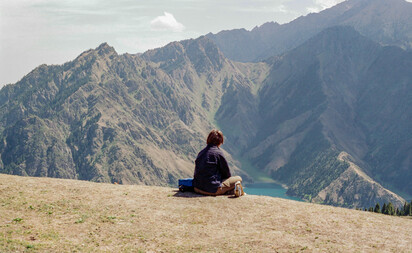
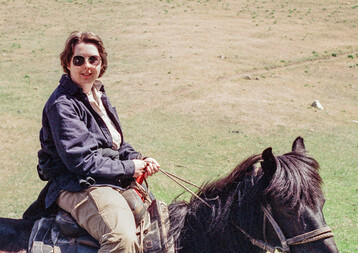
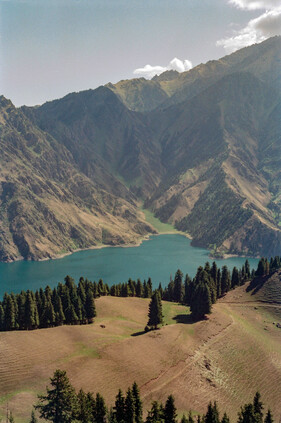
(June 3, 1991) TIANCHI
(June 4, 1991) URUMQI TO KASHGAR
(June 6, 1991) KASHGAR
(June 7, 1991) KASHGAR
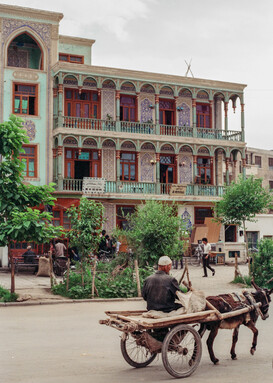
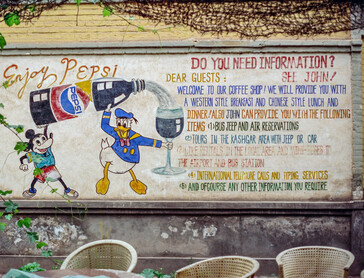
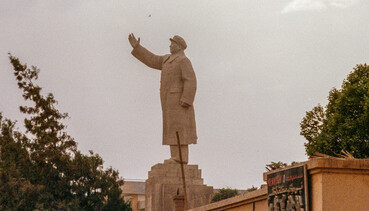
More Photos from Xinjiang
(continued - go to part 3)

